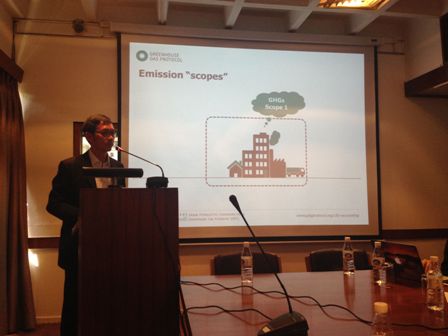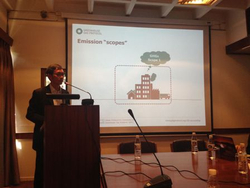Seeking counsel from the experts at the GPC Stakeholder Consultation Workshop

Representatives from ICLEI South Asia and member cities Gwalior, Pune, Kota and Surat were present at the Global Protocol for Community-Scale Greenhouse Gas Emissions (GPC) Stakeholder Consultation Workshop held on the 11th December 2013 in New Delhi, India, which aimed towards seeking from the experts, guidance, direction and ideas for the further development of the GPC, which is an international greenhouse gas (GHG) accounting standard for cities. The GPC is being developed by the World Resources Institute (WRI), C40 Cities Climate Leadership Group and ICLEI – Local Governments for Sustainability. The stakeholder consultation workshop for the GPC witnessed representatives from a conglomerate of various organizations and institutions like Center for Environmental Planning and Technology (CEPT) University, Global Green Growth Institute (GGGI), World Wide Fund for Nature (WWF), U.S. Agency for International Development (USAID), World Business Council for Sustainable Development (WBCSD), Carbon Disclosure Project (CDP), Ernst & Young, Embarq-India, C40 Cities and the Delhi Government.
The focus of the workshop was to share practical experiences on the process of GHG inventorisation for cities and bring forward ideas and opinions on the overall GPC framework. The workshop aimed to enable the participants to gain an understanding regarding the technical aspects of accounting for GHG emissions across sources such as transportation, industrial energy use, waste, residential building energy use, government operations etc. This would further help cities move ahead with accounting for GHG emissions, using a common approach in the form of the GPC standard. Emani Kumar, Executive Director, ICLEI South Asia, took the opportunity to present before all a succinct overview on ICLEI, Harmonized Emissions Analysis Tool Plus (HEAT+) and a first glimpse of Rajkot’s GHG inventory, which is currently ongoing. He also shed light upon the need for developing a data sources list, “Cities will agree that data collection and authentication of data in Indian cities is not an easy task. A data sources list provides information on departments responsible for various particulars.”
City representatives put forward their individual city issues, data availability, various initiatives being taken and eagerness to adopt HEAT + as a tool to measure their GHG emissions. Mangesh Dighe, Environment Officer, Pune, highlighted the need for a tool like HEAT+, “Only when we know the current status of our GHG emissions and can quantify the GHG reduction impact of our initiatives, then we can set targets to be achieved. HEAT + is something that can help cities achieve this.”
The Bangalore transport GHG inventory was presented by Srikanth Shastry, WRI, who stressed upon the equal importance of both bottom-up and top-down approaches for measuring transportation related emissions and further elaborated on the suitability of both the approaches.. The various discussions were convened by Wee Kean Fong, WRI, who also mentioned the reasons that gave rise to the need for a global protocol like unclear boundary definition, double counting, inconsistency etc.
Mr. Fong precisely quoted what famous management Guru, Peter Drucker once said, “You can’t manage what you can’t measure!”
For further information, visit:




